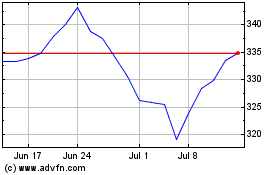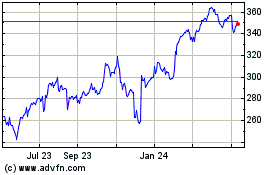By Liz Hoffman
Shares of some high-profile takeover targets are trading at
steep discounts to the prices of deals they signed, showing
fissures may lurk in the current deal boom.
Take Office Depot Inc. The company's stock trades 29% below the
price Staples Inc. agreed in February to pay for its smaller rival.
The gap has doubled since April, reflecting growing investor
worries that antitrust regulators will block a deal to combine the
country's two biggest office-supply chains.
Cigna Corp.'s stock is 22% below the value of Anthem Inc.'s $48
billion offer, while oil-field-services provider Baker Hughes Inc.
trades 17% cheaper than the price of its pending $35 billion sale
to Halliburton Co.
A few percentage points is a more typical discount.
These yawning gaps indicate investors think the transactions,
which have helped drive mergers-and-acquisitions volume to a record
pace, will be blocked or recut under pressure from regulators--or
take longer than expected to close.
Whether they are right is unclear. Investor sentiment isn't a
surefire proxy for a deal's chances of success, and indeed, fewer
agreed-upon deals have failed in 2015 than in any year since 1996,
according to Dealogic. There is also scant evidence that antitrust
regulators are challenging an abnormally high number of
mergers.
But investors who bet on mergers, known as arbitragers, have had
some high-profile setbacks.
After a merger is announced, arbs, as they are known on Wall
Street, typically buy shares of the target company and
simultaneously bet against the acquirer's stock, hoping to profit
as the discount narrows.
The funds can get stung in several ways. They can wager that an
announced deal will close, only to see antitrust officials reject
it. They also suffer paper losses when the discount on a deal they
are betting on widens.
These investors have seen their fair share of both lately.
Event-driven funds, which bet on mergers, spinoffs and other
corporate shake-ups, fell 1.4% on average through October, putting
them on track for their first losing year since 2011, according to
research firm HFR.
Many funds piled into a three-way takeover battle with Teva
Pharmaceutical Industries Ltd., Mylan NV and Perrigo Co., only to
see neither potential transaction materialize. Others wagered on
Yahoo Inc.'s spinoff of its stake in Alibaba Group Holding Ltd., a
bet that ran into trouble when regulators signaled they may not
give it the tax treatment the companies seek. Yahoo is moving ahead
with the spinoff.
Meanwhile, there have been signs that regulators take a dim view
of some of the big pending deals.
They are closely reviewing both Anthem's deal for Cigna and the
$34 billion proposed tie-up of Aetna Inc. and Humana Inc. Together,
the two deals would trim the number of big health insurers from
five to three.
Antitrust officials have also spent longer than expected
reviewing Halliburton's proposed deal for Baker Hughes, which would
combine two of the three largest providers of oil-field services.
The Federal Trade Commission has delayed its ruling on
Staples-Office Depot as it seeks sworn testimony from others in
that market, The Wall Street Journal has reported.
There may be more than just antitrust concerns at play. Arbs
lately have had a lot of deals to choose from, with roughly $4
trillion struck world-wide this year, according to Dealogic. There
has been a particular surfeit of takeovers valued at more than $10
billion. That has caused the investors to stay away from some
deals, widening their discounts. The upshot is that investors are
taking the view that certain trades aren't worth the risk.
And some funds are shedding riskier investments like deal bets
amid broader market turmoil.
"It's ironic. This is the best arbitrage environment that's
existed in years, with so many big deals to choose from," said Ira
Gorsky, an analyst at research firm Elevation LLC. "But some things
haven't played out, and that's been devastating."
It is possible most or all of the deals in question will close
on their original terms and if so, arbitragers who brave the
current trend and pick the right ones stand to profit handsomely.
If, however, too many of them come undone, it could cause
executives contemplating deals to reconsider and threaten the
red-hot M&A market.
Regulators blocked Sysco Corp.'s purchase of US Foods Inc.
earlier this year, and are suing to stop Electrolux AB's deal for
General Electric Co.'s appliance unit. Takeovers of Time Warner
Cable Inc. and T-Mobile US Inc. fell apart amid pushback from
regulators.
That has stoked fear of a coming crackdown by competition
officials among arbs, said Beau Buffier, who heads the antitrust
group at law firm Shearman & Sterling LLP.
"We have seen some very prominent deals challenged or abandoned,
and that sticks in people's minds," he said.
Subscribe to WSJ: http://online.wsj.com?mod=djnwires
(END) Dow Jones Newswires
November 18, 2015 19:47 ET (00:47 GMT)
Copyright (c) 2015 Dow Jones & Company, Inc.
Cigna (NYSE:CI)
Historical Stock Chart
From Mar 2024 to Apr 2024

Cigna (NYSE:CI)
Historical Stock Chart
From Apr 2023 to Apr 2024
